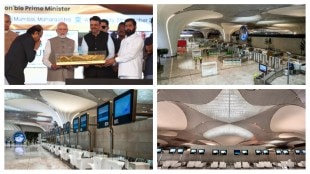That IndiGo is a success story in the country’s aviation history is well known by now. The airline recently celebrated its 18th anniversary, where it announced plans to introduce business class in its flights. As and when this happens, it will add a new chapter in the airline’s history. In that sense, the time is right to tell the story behind the rise of the carrier and how its future trajectory is poised. Journalist Tarun Shukla’s Sky High: The Untold Story of IndiGo, is an exercise in this direction, and it does not disappoint.
In some ways it would not be wrong to compare the successful partnership of Rahul Bhatia and Rakesh Gangwal in steering IndiGo with the Bollywood writer team of Salim-Javed. Both redefined the sectors they operated in. The similarities do not end here—both the partnerships broke. While Salim-Javed’s post-break-up trajectory is now part of history, the story of IndiGo post the break-up of Bhatia and Gangwal will perhaps need another book. Shukla’s book ends at this point, raising several issues and questions with regard to IndiGo’s future journey, which only time can answer.
There are some more similarities between the journeys of Salim-Javed and Bhatia-Gangwal. The break-up of the former happened around a time in the early 1980s, when the genre of angry young man they had created was on the wane and a new kind of cinema was emerging. Observers maintain that the duo’s partnership had run its course and they had peaked, so the break-up was imminent.
In some ways the same holds true with regard to the break-up between Bhatia and Gangwal. Around a time when fissures emerged between the two in 2018, IndiGo had reached its peak. IndiGo still is the largest carrier in India with a market share of little over 60%, but Air India is emerging as a challenger. With the takeover by the Tata Group and the airline merging the four carriers which are part of the Tata Group, a full service carrier and a low-cost carrier will take shape. It will emerge as a formidable challenger, and IndiGo ramping its aircraft with fresh orders and adding a business class, is seen as efforts to successfully meet any such challenge. How IndiGo meets this challenge and whether it continues to maintain the dominance of Indian skies, is a subject of a new book as the story is still to unfold, but Shukla has touched upon these challenges.
However, these are issues of the future. Where the book excels and entertains is in telling the story of the past. The origins are interesting as neither Bhatia nor Gangwal had planned IndiGo. Its birth was quite accidental. London-based businessman Bhupendra Kansagra was trying to revive SK Modi’s defunct airline, Modiluft. The journey moved in a manner that it was leading to the birth of SpiceJet with its current CMD Ajay Singh also on board. Kansagra tried to get in touch with every Indian businessman who had interest in aviation in this regard. The meeting with Bhatia, who was into travel and ticketing business, also took place in this context, and at one point SpiceJet seemed close to launch with Bhatia on board. However, he later changed his mind and decided to launch his own airline in partnership with Gangwal.
The most interesting chapters in the book relate to the aircraft deal Gangwal negotiated with Airbus and the one which profiles him. This also changed the fortunes of the aircraft maker in India, where it was earlier languishing in comparison to Boeing. Gangwal’s sharp negotiations on pricing make for very interesting reading as the gains IndiGo made on contracts with Airbus and the engine makers not only helped it in playing the volume game in the market later, but also in not losing money when engine troubles led to grounding of some planes.
Gangwal comes across as a person with spartan interests but a sharp mind quite focused on numbers. He has the ability to tire out the other party while negotiating on the price and deliverables, but the proposition which he puts forward—IndiGo started negotiating for 100 aircraft—is so attractive that the vendor cannot dismiss him.
Bhatia and his father Kapil Bhatia’s business trajectory is also well depicted, as much is not known about them. Bhatia, much like Gangwal, comes across as a spartan personality, though lesser in degree, and perhaps this explains how the two flew IndiGo to great heights. It is due to this background that when news about problems between the two emerged, observers were quite shocked.
Just as the real reasons behind the parting of Salim-Javed is still not known, so is the case with Bhatia-Gangwal’s break-up. Shukla did speak with both of them on this but was not able to get much, so he has tried to put together what they and others had to say with the developments of the time. To put it simply, the airline having peaked, it was the issue of control that became a sore point. While Gangwal raised issues of related party transactions—IndiGo crew stayed at Bhatia’s InterGlobe-associated hotels, were trained at his simulator centre, and IndiGo’s office operated from his property—Bhatia felt that Gangwal was removing his people from key positions and replacing them with his own, thereby trying to gain control of the airline. This script does not seem totally sound because Gangwal must have known all along about related party deals, so why did it take him so long to raise it? Further, the way the responsibilities were divided between the two, why should the issue of control emerge at such a late stage?
Whatever be the truth, the two came to an agreement that Gangwal would step down and sell off his entire stake by 2025, a process already started by him through bulk deals on the stock exchanges.
The next leg of IndiGo’s flight would be piloted by Bhatia alone and how he traverses this journey would be keenly watched.
Shukla’s work makes for interesting reading as, apart from the story of IndiGo, it also narrates the behind-the-scene story of lobbying and decision-making in the world of civil aviation.
Sky High: The Untold Story of IndiGo
Tarun Shukla
HarperCollins
Pp 272, Rs 699









